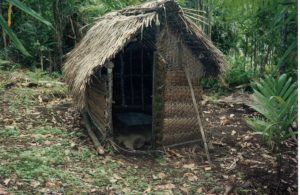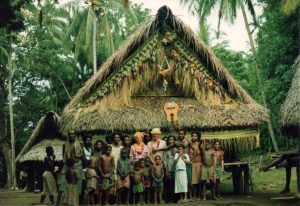Bukuri, was one of a number of villages scattered around the coast of a volcano in the Bismarck Sea called Manum Island just off the south-western coast of mainland Papua New Guinea. We were embarking upon a new phase of our orientation training, that of actually living within a typical Papua New Guinean village. We had packed sufficient ‘cargo’ to see us through six weeks, a minimum of clothing, maximum of anything else that we considered we might need to survive. I had made an ‘oven’ out of some old oil drums which we took with us together with flour for bread making, oil for cooking, a recorder, pencils, and notebooks for language data collection and presents for our hosts together with medical supplies.
The latter were of the utmost importance since medical help was practically non-existent and even then, only reached by a long trek through difficult terrain. We had no other means of communication. Also, since my wife was a nurse, it would be difficult for her to stand on one side if there was a medical emergence in such an isolated place, that we took more medical supplies than that which we might otherwise need for ourselves alone. Notwithstanding this she did learn quite a lot about different tribal treatments which some, seemingly quite bizarre, actually appeared to be an effective cure.
We arrived on the island, having sailed from Bogia on the mainland by means of a banana boat, a distance of about 10 Kilometres. We were met by a large party of half-naked and painted men standing on the shoreline of a narrow pebbly beach. The men were from the village we were destined to spend the next six weeks with. If we had not known otherwise our ‘welcome’ could have been quite frightening since we were literally pelted as we approached the shore, with a soft apple-like fruit accompanied by ‘mock’ war cries, waving of spears and menacing gestures, all suggesting that our arrival was anything but welcome. We later discovered that this was how strangers in the past would have been welcomed by a show of strength and general hostility. In fact, many missionaries in the early days actually met their death at this point and ended up in the cooking pot!
Once on the beach we could not understand why we were being held there. Eventually someone came running out of the bush, our cargo whisked away, and we were escorted, via a narrow ascending path, off the beach and into the bush. Once again, we were held up, then suddenly, propelled forward, we entered a clearing lined with villagers, both male and female, young and old, each highly decorated and in traditional costume. We had no idea exactly what would happen next, and neither could we understand one word of what was being spoken but slowly we were led towards a tree trunk lying on the ground and by means of gesticulations it became obvious that we were to sit down. Next, we too were decorated, garlands placed around our necks, faces painted, and introductions made to the more important village people. Eventually food was placed in front of us by a woman clad only in a grass skirt purpur, most embarrassing! The lady in question was the first wife namba wan meri bilong em of the village head man or Kukurai whom we came to know quite well through occasional visits to our house Haus bilong mitupela bringing betel nut buai na kurita and octopus. Although by this time we were quite hungry we were not too sure whether we should just tuck in or wait. We decided to wait but the silence generally was becoming so embarrassing that it suddenly dawned upon us that until we began to eat neither could anyone else, so we tucked in much to the delight of all those present.
Because of my age and silvery grey hair, I was considered to be someone of importance and hence duly installed, together with my wife, as an honorary Kukurai. Symbols of our now exalted position within the community were hung around our necks and new names given, I Muriki and my wife Arkaina, both venerated ancestral names. Formalities over, celebrations began with singing, dancing and music singsing in our honour. My wife, who has a love of dancing, also took part much to the delight of everyone. Eventually festivities came to an end, and we were taken to see what was to be our home for the duration of our stay on the island.

The house was brand new, stood on stilts and made from bush materials. It consisted of a living room and bedroom but no furniture of any kind, one simply slept, sat and ate on the rickety split bamboo floor. We had a toilet liklik haus which was the only one in the village and made especially for us. This too was built from bush materials and simply covered a hole in the ground. It was about seventy yards away from our house and accessed by a narrow winding path hacked out of the bush – not the best location for a visit in the middle of the night! We questioned why a big stick was placed by the door only to be told that we were to use it to rattle on the walls before entering so as to scare away snakes which would frequently coil up inside.
Before we could settle into our home further introductions were made, but this time to our official guardians Was Papa and Was Meri and their teen-age son, Laurence, whose responsibility it was to escort me, for my safety, everywhere I went. Eventually I was trusted to move around freely, even visit the next village alone to check up on a couple of young ladies, trainees like us, who were experiencing problems.

The house was decorated on the outside, making it visually quite attractive, using colourful bush materials. The person, whose name was Paul, credited with the decoration ‘Bilas’, lived in an adjacent hut built directly on the ground – a simply affair. He was an elderly person, quite small but wiry and living on his own. We were not sure whether he had previously been married, now widowed or had always been single. There did seem to be some qualification required for the privilege of decorating the house but, if there was, we didn’t find out. However, custom, we were led to understand, dictated that whoever decorated the house was not allowed to enter it at all, neither was he allowed to partake of any food which had been prepared or passed through the house.
This, for us, was potentially problematic in that we were given, from time to time, octopus which my wife felt she could not refuse but equally, did not fancy; the donor was the wife of the ‘Kukurai’. Paul, we learned, simply loved octopus, so at dead-of-night I would, by prior arrangement, give it to him. I am not sure if we were ever found out, but it did solve our problem, made one elderly gentleman very happy and, maybe more importantly, avoided possible inter-cultural conflict.